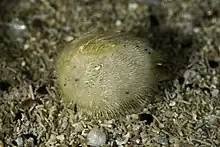Echinocardium flavescens
Echinocardium flavescens, sometimes called the yellow sea potato,[1][2] is a species of sea urchin in the family Loveniidae, chiefly found in the northeast Atlantic region.[3]
| Echinocardium flavescens | |
|---|---|
 | |
| Specimen recorded off the Isle of Man | |
| Scientific classification | |
| Domain: | Eukaryota |
| Kingdom: | Animalia |
| Phylum: | Echinodermata |
| Class: | Echinoidea |
| Order: | Spatangoida |
| Family: | Loveniidae |
| Genus: | Echinocardium |
| Species: | E. flavescens |
| Binomial name | |
| Echinocardium flavescens O. F. Müller, 1776 | |
| Synonyms | |
| |
Description
Echinocardium flavescens is about 5 cm (2.0 in) long. It is yellow to the tube feet (hence the name flavescens, "yellowish")[4] and has spines on the underside of the body. The frontal ambulacrum is not indented and there are larger spines in the interambulacral areas of the upper side of the test. Its labrum is long, reaching the second pair of ambulacral plates.[5]
Distribution
Found in the waters off Great Britain, Ireland and associated islands.[6]
Biology
Matures in early summer.[7]
Ecology
Echinocardium flavescens buries itself about 4 in (100 mm) deep in coarse gravel in the sublittoral,[8] up to depths of 200 m (660 ft),[7] sometimes associated with the sea cucumber Neopentadactyla mixta or the brittle star Ophiopsila annulosa.[5]
References
- "Common Heart Urchin - Echinocardium cordatum". www.seawater.no.
- Cole, Theodor C. H. (April 20, 2015). "Wörterbuch der Tiernamen: Latein-Deutsch-Englisch Deutsch-Latein-Englisch". Springer-Verlag – via Google Books.
- "Echinocardium flavescens (O.F.Müller, 1776)". www.gbif.org.
- Farjon, A. (2010). A Handbook of the World's Conifers: Revised and Updated Edition. Brill. ISBN 9789047430629. Retrieved 2023-03-27.
- "Echinocardium flavescens - Marine Life Encyclopedia". www.habitas.org.uk.
- "Echinocardium flavescens - Detail - Biodiversity Maps". maps.biodiversityireland.ie.
- "WoRMS - World Register of Marine Species - Echinocardium flavescens (O.F. Müller, 1776)". www.marinespecies.org.
- The annals and magazine of natural history, zoology, botany and geology: incorporating the journal of botany. Vol. 18. Taylor & Francis. 1886. p. 354. Retrieved 2023-03-27.